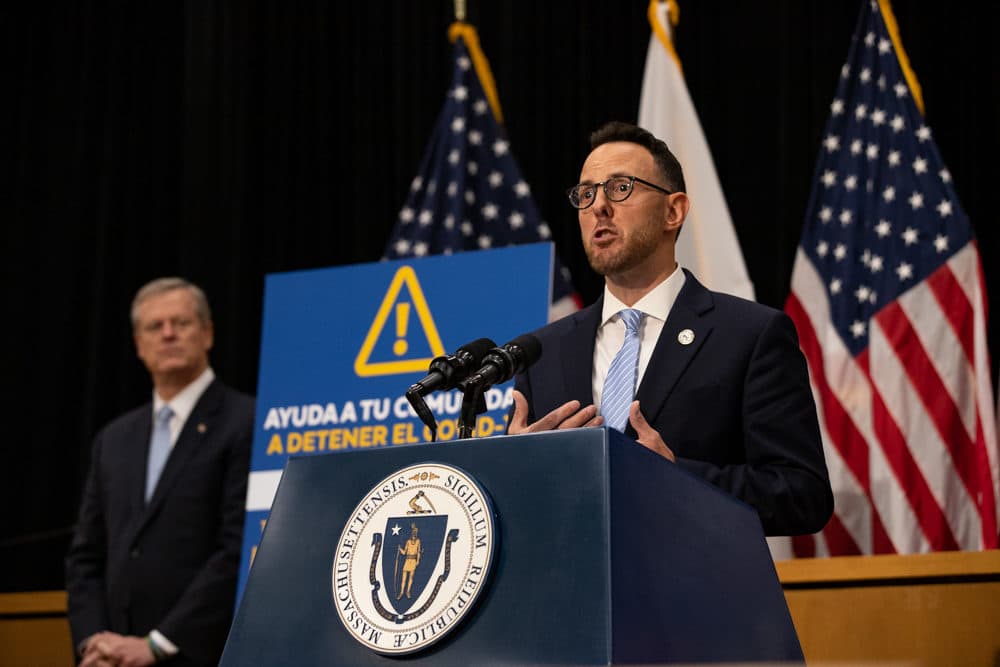Advertisement
Baker Admin Launches Campaign To Fight Virus Spread In 5 High-Risk Communities

Field teams will fan out across 15 locations this weekend to encourage people to do their part to slow the spread of the coronavirus and connect them with resources as the Baker administration launches a new campaign to address the five Massachusetts communities that have shown the most persistently high COVID-19 case and transmission rates.
An extension of the COVID-19 Enforcement and Intervention Team announced in August to assist high-risk communities, the newest effort is expected to feature billboard ads, digital and social media messaging, multi-lingual field teams, phone and text outreach, and communication with local organizations. It will all be focused on Chelsea, Everett, Lawrence, Lynn and Revere — five communities that the governor said have recorded "persistent dangerously-high transmission rates" for the potentially fatal virus.
"The goal here is to make sure people understand what's going on in their community, where resources are available and what they can do themselves to stop the spread," Gov. Charlie Baker said. He added, "People have the power here to save a life and everybody needs to do their part to stop the virus."
The statewide average daily incidence rate of COVID-19 in Massachusetts was 4.2 cases per 100,000 people over the last two weeks, the Baker administration said. It was 29.4 in Chelsea, Revere recorded a rate of 20.9, Lynn saw a 12.1 reading, Everett tallied 15.9 cases per 100,000 people and the rate in Lawrence was 14.9.
Secretary of Health and Human Services Marylou Sudders said the campaign comes with a new state website, www.mass.gov/stopcovid19, that will provide connections to resources and will post informational materials that can be printed out and displayed at businesses, housing complexes and in other places.
"This initiative brings even greater focus to the top five highest risk communities with regular neighborhood-level assessments to determine factors contributing to trends and most effectively use all of our collective resources. It also strengthens the collaboration, which is very strong, between local police and the Executive Office of Public Safety and Security," Sudders said. "It includes a multi-lingual, multi-cultural public messaging campaign that begins today and will run in each of these communities for the next four to eight weeks. We'll assess progress during this time as well, considering additional communities as warranted. And it will be tailored specifically for the municipalities."
Revere Mayor Brian Arrigo, who joined Baker and Sudders for a press conference at the State House on Thursday, said his city saw an average of 12.6 new cases of COVID-19 each day in August, up from an average of six daily new cases in July.
Revere and other cities that are part of the enhanced intervention campaign share many similarities, he said.
"We are cities of essential employees and frontline workers, many of whom rely on public transportation to continue to report to work. Many of our residents live in densely-populated areas and multi-generational and multi-family homes, and we continue to see clusters of cases emerge at single addresses," the mayor said. "Half of our population is comprised of immigrants and communities of color. We know that this virus impacts Black and brown communities disproportionately and we are seeing those impacts in the city of Revere."
Sudders also touched upon the topic of people, especially those in the five communities that are subject to the intervention, who live in the same home as extended family members.
"If you live in a home with extended family members or a family member with an underlying condition, you should wear a mask inside your home," Sudders said before repeating the advice a second time.
The latest intervention is in addition to the state's recent practice of assigning a color to each of the 351 cities and towns in Massachusetts corresponding to the rate of new coronavirus cases there. There are eight communities — Chelsea, Everett, Framingham, Lawrence, Lynn, Revere, Winthrop and Westhampton — in the "red" or high risk category, a designation assigned to communities with a daily average of more than eight cases per 100,000 residents reported over the last two weeks.
"All residents in those communities really ought to stay home if they feel sick and they really do need to get tested, if they go out. No one can afford to gather in large groups in these communities," Baker said. "This is critically important, time and time again, as our contact tracers have reached out to and engaged people who've become infected, gatherings — unsupervised, unofficial, people being familiar with people they're familiar with — play a major role in the spread of COVID."
After Arrigo mentioned that people in his city are "tired of restrictions and of the sacrifices that they continue to make to protect themselves and their loved ones," Baker said he feels the same way. But he urged people to not simply throw up their hands and give up on combatting COVID-19.
"The mayor made an excellent point when he talked about the fact that people are tired. I got news for you: I am too, so is the lieutenant governor, so is Secretary Sudders, and so are a lot of the people who work on our teams. And I know the mayor and his folks are also tired. None of us were brought up anticipating that we would end up living a significant portion of our lives away from a lot of the people that we normally spend time with," Baker said. "And the constant inability to hug people, to engage in any kind of traditional group gathering that we would normally do as a matter of course on a regular basis is psychologically exhausting."